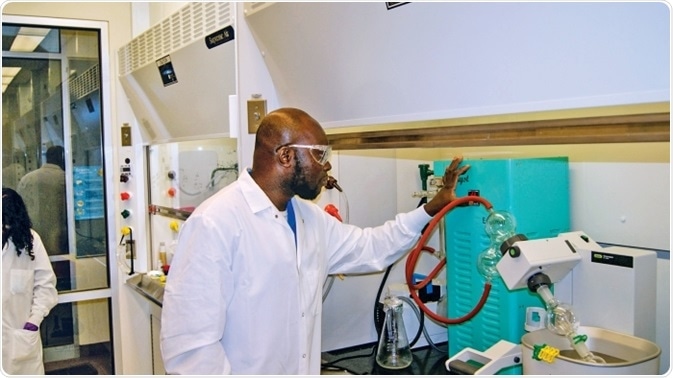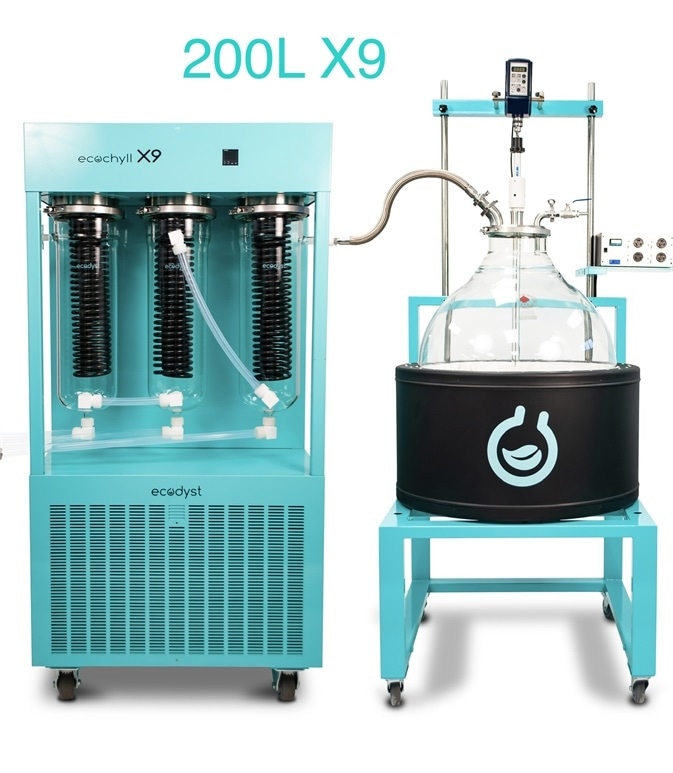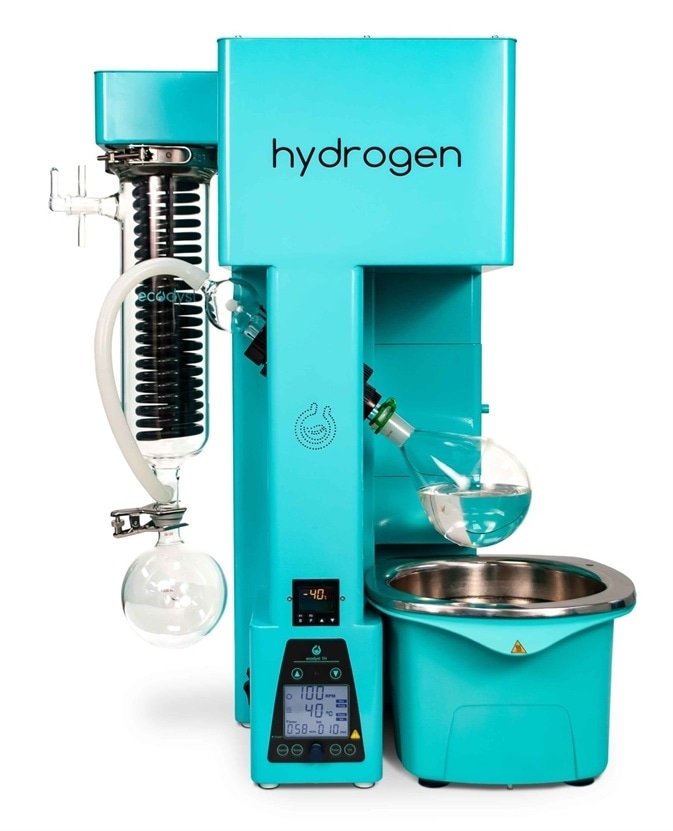Sponsored Content by EcodystApr 1 2021

Image Credit: Ecodyst
Evaporation is used by laboratory rotary evaporators to efficiently and gently remove solvents from a variety of sample types. This includes both inorganic and organic analytes and polymeric materials.
A sample is heated while its boiling point is simultaneously decreased by a vacuum that is induced by the lab rotary evaporator. The boiling point reduces when the pressure of the liquid is decreased, and the solvent can be vaporized at a much lower temperature than its normal boiling point.
This is what makes a rotary evaporation unit an extremely economical and efficient process.
EcoChyll lab rotary evaporators from Ecodyst
Ecodyst’s EcoChyll lab rotary evaporators are at the cutting-edge of the evaporative process producing the first lab rotary evaporators that use metal condensers.
The refrigeration line of the devices can be connected directly to the condenser coils because metal is more conductive and stronger than glass. Ecodyst’s range is very efficient, which ensures that more vapor substance is condensed.
EcoChyll X7 and X9 and other large-scale EcoChyll models can carry up to 200 liters in just one solvent recovery process, meaning a reduced amount of mechanization for rates of solvent recovery is needed, and less manpower is required for each evaporation.

Image Credit: Ecodyst
At the other end of the scale are the EcoChyll S and hydrogen designed small-scale (benchtop) evaporation up to 5 liters where space is a high priority.
These innovative devices have intelligent self-cooling condenser technology that is both extremely fast and very efficient at condensing vapors, including aqueous solvents.
Both EcoChyll S and hydrogen achieve rapid cool down, reaching -40C in 60 seconds, and are always available, successfully increasing productivity, eliminating downtime, and saving money and time.
As a highly efficient, plug-and-play condenser, EcoChyll S upgrades any benchtop rotovap by replacing dry ice, traditional water or glycol chiller condensers.

Image Credit: Ecodyst
The Hydrogen is a powerful, small-footprint, plug-and-play rotovap, with intelligent self-cooling, invented for scientists by scientists. It has superior advantages, such as extremely quick rates of evaporation and a large cooling survey area condenser, allowing scientists to focus on more complex tasks.
Lab rotary evaporators that are more environmentally friendly
Ecodyst’s lab rotary evaporators can by-pass cooling systems that use undesirable methods and materials and consume a large amount of energy, making evaporation by EcoChyll more environmentally friendly.
They are an energy-efficient alternative to traditional lab rotary evaporators, which utilize thousands of gallons of tap water per year, use large amounts of energy cooling antifreeze, or waste dry ice.
Lab rotary evaporators that are more cost-effective
The industrial-scale lab rotary evaporators from Ecodyst do not make use of expensive rotary motor mechanisms, making them the cost-effective option. The EcoChyll® X3 and X5 medium-scale lab rotary evaporator systems (12 to 22 liters), for example, are an extremely efficient alternative to all existing evaporator technologies.
The same intelligent self-cooling metallic condenser technology as other instruments in the EcoChyll range is at the core of the cost-effective X5, which features a single condenser in a space-friendly yet robust unit. The X5 reduces costs in the long term by saving both manpower and time.
Ecodyst’s lab rotary evaporators minimize waste, as well as the costs deriving from the use of water or dry ice, resulting in almost no operational costs associated with these models.
Ecodyst’s lab rotary evaporators are easy to use and more convenient
The EcoChyll consumer-driven lab rotary evaporator range is easy to use, with no large evaporation vessels which need to be removed. Developed with the aim of increasing the efficiency of users’ experiences, this consumer-driven range drives down costs.
Lab rotary evaporators from Ecodyst are sustainable, practical and cost-effective. If you would like to find out more, contact us today.
About Ecodyst
Ecodyst was founded in 2014 by George Adjabeng and Kwabena Williams. Both had a desire to provide chemistry labs with the best solutions possible to maximize productivity at a lower cost, while also creating a safer workplace environment. Ecodyst’s rotovaps improve upon every aspect of the process, providing better samples exponentially faster and more efficiently without exposing the chemist to health hazards such as carbon dioxide and frostbite.
Ecodyst’s disruptive technology will ultimately set new standards for laboratories worldwide and facilitate unprecedented discoveries in countless fields of research. The revolutionary EcoChyll® is already in use by top chemists and laboratories at major universities in the United States, and it’s only the beginning. George and Kwabena’s hopes are that faster, safer rotovaps will lead to more discoveries and lives saved in the process.
Sponsored Content Policy: News-Medical.net publishes articles and related content that may be derived from sources where we have existing commercial relationships, provided such content adds value to the core editorial ethos of News-Medical.Net which is to educate and inform site visitors interested in medical research, science, medical devices and treatments.

Image Credit: Ecodyst
Evaporation is used by laboratory rotary evaporators to efficiently and gently remove solvents from a variety of sample types. This includes both inorganic and organic analytes and polymeric materials.
A sample is heated while its boiling point is simultaneously decreased by a vacuum that is induced by the lab rotary evaporator. The boiling point reduces when the pressure of the liquid is decreased, and the solvent can be vaporized at a much lower temperature than its normal boiling point.
This is what makes a rotary evaporation unit an extremely economical and efficient process.
EcoChyll lab rotary evaporators from Ecodyst
Ecodyst’s EcoChyll lab rotary evaporators are at the cutting-edge of the evaporative process producing the first lab rotary evaporators that use metal condensers.
The refrigeration line of the devices can be connected directly to the condenser coils because metal is more conductive and stronger than glass. Ecodyst’s range is very efficient, which ensures that more vapor substance is condensed.
EcoChyll X7 and X9 and other large-scale EcoChyll models can carry up to 200 liters in just one solvent recovery process, meaning a reduced amount of mechanization for rates of solvent recovery is needed, and less manpower is required for each evaporation.

Image Credit: Ecodyst
At the other end of the scale are the EcoChyll S and hydrogen designed small-scale (benchtop) evaporation up to 5 liters where space is a high priority.
These innovative devices have intelligent self-cooling condenser technology that is both extremely fast and very efficient at condensing vapors, including aqueous solvents.
Both EcoChyll S and hydrogen achieve rapid cool down, reaching -40C in 60 seconds, and are always available, successfully increasing productivity, eliminating downtime, and saving money and time.
As a highly efficient, plug-and-play condenser, EcoChyll S upgrades any benchtop rotovap by replacing dry ice, traditional water or glycol chiller condensers.

Image Credit: Ecodyst
The Hydrogen is a powerful, small-footprint, plug-and-play rotovap, with intelligent self-cooling, invented for scientists by scientists. It has superior advantages, such as extremely quick rates of evaporation and a large cooling survey area condenser, allowing scientists to focus on more complex tasks.
Lab rotary evaporators that are more environmentally friendly
Ecodyst’s lab rotary evaporators can by-pass cooling systems that use undesirable methods and materials and consume a large amount of energy, making evaporation by EcoChyll more environmentally friendly.
They are an energy-efficient alternative to traditional lab rotary evaporators, which utilize thousands of gallons of tap water per year, use large amounts of energy cooling antifreeze, or waste dry ice.
Lab rotary evaporators that are more cost-effective
The industrial-scale lab rotary evaporators from Ecodyst do not make use of expensive rotary motor mechanisms, making them the cost-effective option. The EcoChyll® X3 and X5 medium-scale lab rotary evaporator systems (12 to 22 liters), for example, are an extremely efficient alternative to all existing evaporator technologies.
The same intelligent self-cooling metallic condenser technology as other instruments in the EcoChyll range is at the core of the cost-effective X5, which features a single condenser in a space-friendly yet robust unit. The X5 reduces costs in the long term by saving both manpower and time.
Ecodyst’s lab rotary evaporators minimize waste, as well as the costs deriving from the use of water or dry ice, resulting in almost no operational costs associated with these models.
Ecodyst’s lab rotary evaporators are easy to use and more convenient
The EcoChyll consumer-driven lab rotary evaporator range is easy to use, with no large evaporation vessels which need to be removed. Developed with the aim of increasing the efficiency of users’ experiences, this consumer-driven range drives down costs.
Lab rotary evaporators from Ecodyst are sustainable, practical and cost-effective. If you would like to find out more, contact us today.
About Ecodyst
Ecodyst was founded in 2014 by George Adjabeng and Kwabena Williams. Both had a desire to provide chemistry labs with the best solutions possible to maximize productivity at a lower cost, while also creating a safer workplace environment. Ecodyst’s rotovaps improve upon every aspect of the process, providing better samples exponentially faster and more efficiently without exposing the chemist to health hazards such as carbon dioxide and frostbite.
Ecodyst’s disruptive technology will ultimately set new standards for laboratories worldwide and facilitate unprecedented discoveries in countless fields of research. The revolutionary EcoChyll® is already in use by top chemists and laboratories at major universities in the United States, and it’s only the beginning. George and Kwabena’s hopes are that faster, safer rotovaps will lead to more discoveries and lives saved in the process.
Sponsored Content Policy: News-Medical.net publishes articles and related content that may be derived from sources where we have existing commercial relationships, provided such content adds value to the core editorial ethos of News-Medical.Net which is to educate and inform site visitors interested in medical research, science, medical devices and treatments.